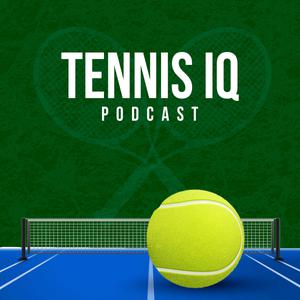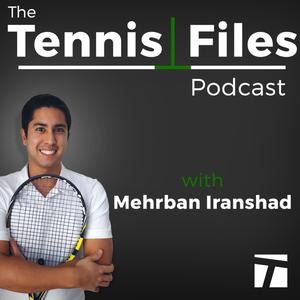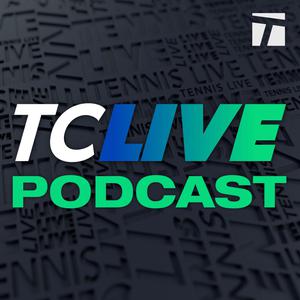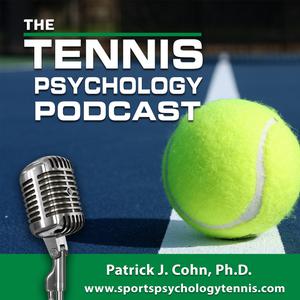
Tennis IQ Podcast
Tennis IQ Podcast
Ninety percent of tennis performance is mental and that's what makes the sport so difficult. Sport psychology professionals Brian Lomax and Josh Burger share their insights on mental performance in tennis, discuss current events in the world of tennis, and interview guests with a unique perspective on mental toughness. Whether you want to learn more about the mental game in tennis or you just have an interest in the sport, this is the podcast for you. Send your questions to [email protected] or via Twitter using #tennisiq.
- 46 minutes 2 secondsEp. 202 - The Paradox of the Ego
In this episode, Brian and Josh discuss a concept known as "the paradox of the ego." In short, the paradox is that it is necessary to have a strong ego in order to eventually let go of it. The co-hosts address how tennis players can eventually learn to put their own egos about results, rankings, ratings, and comparisons aside for the benefit of their future and development.
To learn more about Josh and Brian's backgrounds and sport psychology businesses, go to TiebreakerPsych.com and PerformanceXtra.com. If you have feedback about the show or questions on the mental game in tennis you can email us at [email protected]. If you’re enjoying the show please rate us on your favorite podcast platform including Apple Podcasts and Spotify and write a review. Don’t forget to subscribe on YouTube or your podcast platform of choice (Apple Podcasts, Spotify, etc.) to stay up to date on future episodes.
4 January 2025, 10:57 pm - 37 minutes 55 secondsEp. 201 - How to Play With Equanimity (A Balanced Mind)
In this episode, Josh and Brian draw inspiration from a quote by Marcus Aurelius related to recovering one's mental balance after being upset by circumstances. Practical applications of the concept are discussed as is a concept called 'The Equanimity Game.'
How to Play the Equanimity Game: https://youtu.be/eE-gv3uawZA?si=argOrcNZJvR1
To learn more about Josh and Brian's backgrounds and sport psychology businesses, go to TiebreakerPsych.com and PerformanceXtra.com. If you have feedback about the show or questions on the mental game in tennis you can email us at [email protected]. If you’re enjoying the show please rate us on your favorite podcast platform including Apple Podcasts and Spotify and write a review. Don’t forget to subscribe on YouTube or your podcast platform of choice (Apple Podcasts, Spotify, etc.) to stay up to date on future episodes.
23 December 2024, 8:17 pm - 56 minutes 39 secondsEp. 200 - What We Learned from 200 Episodes
In this episode, Brian and Josh discuss their most important takeaways from the first 200 episodes of the Tennis IQ Podcast. Let us know what you have learned on this journey!
To learn more about Josh and Brian's backgrounds and sport psychology businesses, go to TiebreakerPsych.com and PerformanceXtra.com. If you have feedback about the show or questions on the mental game in tennis you can email us at [email protected]. If you’re enjoying the show please rate us on your favorite podcast platform including Apple Podcasts and Spotify and write a review. Don’t forget to subscribe on YouTube or your podcast platform of choice (Apple Podcasts, Spotify, etc.) to stay up to date on future episodes.12 December 2024, 5:31 pm - 36 minutes 21 secondsEp. 199 - Using the "4 i Framework" to Design Your Practices
In this episode, Brian and Josh discuss the “4 i’s” of intentional practice. This is based on a model of intentional practice (article linked below) by Dan Abrahams in which intentional training is divided into four areas: interesting, intense, internalize and integrated. The co-hosts discuss how tennis players, coaches, and parents can incorporate these key elements into each practice to ensure that it is done in an intentional and deliberate way.
Article - https://tinyurl.com/2uv636m6
To learn more about Josh and Brian's backgrounds and sport psychology businesses, go to TiebreakerPsych.com and PerformanceXtra.com. If you have feedback about the show or questions on the mental game in tennis you can email us at [email protected]. If you’re enjoying the show please rate us on your favorite podcast platform including Apple Podcasts and Spotify and write a review. Don’t forget to subscribe on YouTube or your podcast platform of choice (Apple Podcasts, Spotify, etc.) to stay up to date on future episodes.4 December 2024, 8:47 pm - 37 minutesEp. 198 - Roger Writes a Letter to Rafa | Thoughts on Nadal's Legacy
Prior to Rafael Nadal's last match at the 2024 Davis Cup, Roger Federer penned a letter in tribute to Rafa's legendary career and their shared journey. Josh and Brian discuss Federer's thoughts on Rafa as well as the legacy that Nadal leaves in tennis as one of the sports greatest champions.
To learn more about Josh and Brian's backgrounds and sport psychology businesses, go to TiebreakerPsych.com and PerformanceXtra.com. If you have feedback about the show or questions on the mental game in tennis you can email us at [email protected]. If you’re enjoying the show please rate us on your favorite podcast platform including Apple Podcasts and Spotify and write a review. Don’t forget to subscribe on YouTube or your podcast platform of choice (Apple Podcasts, Spotify, etc.) to stay up to date on future episodes.
24 November 2024, 5:03 pm - 34 minutesEp. 197 - Coaching and Self-Reliance on the Court
In this episode, Brian and Josh discuss the importance of self-reliance on the tennis court. They talk about how tennis players can take responsibility for themselves and their actions in practice and matches which ultimately can lead to better results long-term. They also referenced a recent Forbes article (link below) that Josh was quoted in regarding this topic and potential changes to coaching in professional tennis.
Forbes article - https://www.forbes.com/sites/timellis/2024/10/23/is-off-court-coaching-a-necessary-support-for-tennis-players/
To learn more about Josh and Brian's backgrounds and sport psychology businesses, go to TiebreakerPsych.com and PerformanceXtra.com. If you have feedback about the show or questions on the mental game in tennis you can email us at [email protected]. If you’re enjoying the show please rate us on your favorite podcast platform including Apple Podcasts and Spotify and write a review. Don’t forget to subscribe on YouTube or your podcast platform of choice (Apple Podcasts, Spotify, etc.) to stay up to date on future episodes.19 November 2024, 7:18 pm - 1 hour 13 minutesEp. 196 - Dominik Hrbatý | Developing Your Brain & How to Beat Great Players
In this episode, Brian and Josh interview Dominik Hrbatý. Dominik Hrbatý is a former professional tennis player from Slovakia. He reached the semifinals of the 1999 French Open, and achieved a career-high singles ranking of world No. 12 in October of 2005. Hrbatý is one of only three players, alongside Nick Kyrgios and Lleyton Hewitt, to have beaten each member of the Big Three (Novak Djokovic, Roger Federer, and Rafael Nadal) the first time he played them. During his playing career, he had over 30 wins vs top 10 players. In this conversation, we discuss Dominik's upbringing in the sport, the key role his father played in his development, how he learned to play his style of tennis, and his thoughts on being a coach.
Tennis IQ Patreon Page: https://www.patreon.com/tennisiqpodcast/membership
To learn more about Josh and Brian's backgrounds and sport psychology businesses, go to TiebreakerPsych.com and PerformanceXtra.com. If you have feedback about the show or questions on the mental game in tennis you can email us at [email protected]. If you’re enjoying the show please rate us on your favorite podcast platform including Apple Podcasts and Spotify and write a review. Don’t forget to subscribe on YouTube or your podcast platform of choice (Apple Podcasts, Spotify, etc.) to stay up to date on future episodes.9 November 2024, 4:17 pm - 47 minutes 36 secondsEp. 195 - The Benefits of Slowing Down
In this episode, Brian and Josh discuss the benefits of slowing down. Slowing down begins as a perspective that then translates into action. The process and benefits of slowing down apply in the long-term (your career), as well as in a match, and between points. Players can also benefit from the idea that “slow is smooth, smooth is fast."
Tennis IQ Patreon Page: https://www.patreon.com/tennisiqpodcast/membership
To learn more about Josh and Brian's backgrounds and sport psychology businesses, go to TiebreakerPsych.com and PerformanceXtra.com. If you have feedback about the show or questions on the mental game in tennis you can email us at [email protected]. If you’re enjoying the show please rate us on your favorite podcast platform including Apple Podcasts and Spotify and write a review. Don’t forget to subscribe on YouTube or your podcast platform of choice (Apple Podcasts, Spotify, etc.) to stay up to date on future episodes.3 November 2024, 2:47 pm - 38 minutes 41 secondsEp. 194 - Embracing Pain, Uncertainty, and Hard Work
In this episode, Brian and Josh discuss how tennis players can embrace pain, uncertainty, and hard work. The inspiration for this topic came from the chapter titled ‘“I LOVE PUH” (YOU?)’ on pages 600 and 601 from the book Areté by Brian Johnson. The co-hosts reviewed how tennis players can embrace the challenges of life and competitive sport including the necessary pain, uncertainty, and hard work that come along with the journey. They offered practical suggestions that tennis players can implement to embrace the challenges they encounter head-on, and learn to love these challenging aspects of life and tennis.
Tennis IQ Patreon Page: https://www.patreon.com/tennisiqpodcast/membership
To learn more about Josh and Brian's backgrounds and sport psychology businesses, go to TiebreakerPsych.com and PerformanceXtra.com. If you have feedback about the show or questions on the mental game in tennis you can email us at [email protected]. If you’re enjoying the show please rate us on your favorite podcast platform including Apple Podcasts and Spotify and write a review. Don’t forget to subscribe on YouTube or your podcast platform of choice (Apple Podcasts, Spotify, etc.) to stay up to date on future episodes.21 October 2024, 2:06 pm - 1 hour 17 minutesEp. 193 - Bob Litwin and Living the Best Story of Your Life
In this episode, Brian and Josh talked with Bob Litwin about how to use storytelling and writing to improve your tennis and your life. Bob Litwin is an executive, sports and life performance coach and author of the best selling book, Live the Best Story of Your Life: A World Champion’s Guide to Lasting Change. He was the first non ATP tour, non Division 1 college tennis player inducted into the USTA Eastern Tennis Hall of Fame, and was a recipient of the Vitas Gerulaitis Community Service Award. His tennis career includes being an ITF World Champion, ITF #1 world ranked player, two-time ITF World Team Champion, two-time Maccabi Gold Medalist and 29-time USTA National Champion.
Bob's Book: Live the Best Story of Your Life: A World Champion’s Guide to Lasting Change
Tennis IQ Patreon Page: https://www.patreon.com/tennisiqpodcast/membership
To learn more about Josh and Brian's backgrounds and sport psychology businesses, go to TiebreakerPsych.com and PerformanceXtra.com. If you have feedback about the show or questions on the mental game in tennis you can email us at [email protected]. If you’re enjoying the show please rate us on your favorite podcast platform including Apple Podcasts and Spotify and write a review. Don’t forget to subscribe on YouTube or your podcast platform of choice (Apple Podcasts, Spotify, etc.) to stay up to date on future episodes.9 October 2024, 9:13 pm - 42 minutes 32 secondsEp. 192 - Playing Against Weaker Opponents and With Weaker Partners
In this episode, Brian and Josh respond to two questions from a listener. The first question was about how to handle playing against weaker opponents, and the second question was about how to play with a partner that is weaker than you. The co-hosts discuss each question in detail and provide some guidance on both of these common scenarios.
Tennis IQ Patreon Page: https://www.patreon.com/tennisiqpodcast/membership
To learn more about Josh and Brian's backgrounds and sport psychology businesses, go to TiebreakerPsych.com and PerformanceXtra.com. If you have feedback about the show or questions on the mental game in tennis you can email us at [email protected]. If you’re enjoying the show please rate us on your favorite podcast platform including Apple Podcasts and Spotify and write a review. Don’t forget to subscribe on YouTube or your podcast platform of choice (Apple Podcasts, Spotify, etc.) to stay up to date on future episodes.29 September 2024, 11:44 pm - More Episodes? Get the App
Your feedback is valuable to us. Should you encounter any bugs, glitches, lack of functionality or other problems, please email us on [email protected] or join Moon.FM Telegram Group where you can talk directly to the dev team who are happy to answer any queries.
 The Tennis Files Podcast
The Tennis Files Podcast
 Tennis Channel Live Podcast
Tennis Channel Live Podcast
 Holding Court with Patrick McEnroe
Holding Court with Patrick McEnroe
 Essential Tennis Podcast - Instruction, Lessons, Tips
Essential Tennis Podcast - Instruction, Lessons, Tips
 The Tennis Psychology Podcast
The Tennis Psychology Podcast
 Tennis Quick Tips | Fun, Fast and Easy Tennis - No Lessons Required
Tennis Quick Tips | Fun, Fast and Easy Tennis - No Lessons Required